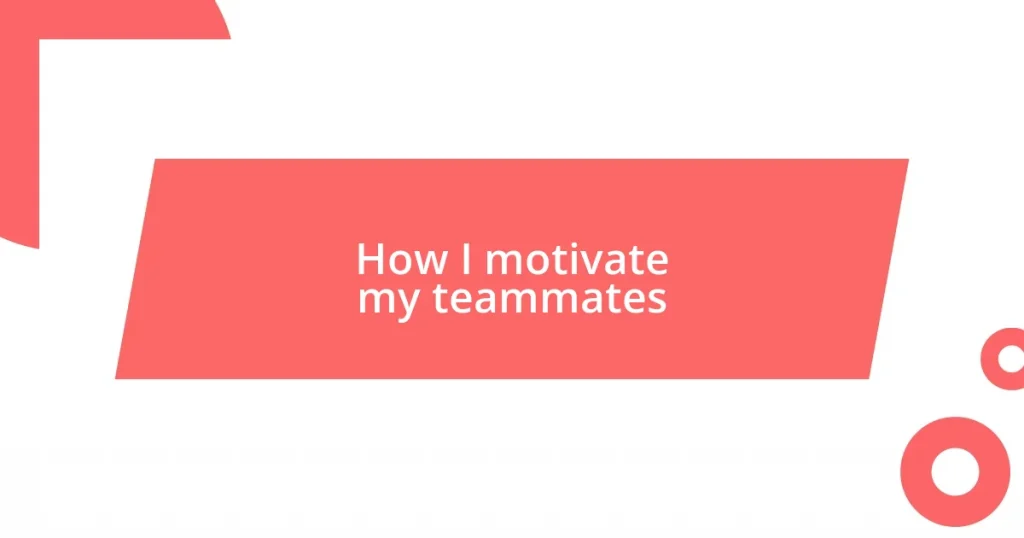Key takeaways:
- Sharing personal goals and recognizing individual strengths fosters motivation and enhances team dynamics.
- Creating a positive team culture through open communication, celebration of diversity, and support boosts morale and productivity.
- Constructive feedback and celebrating team successes are essential in nurturing a motivated environment and reinforcing a sense of collective achievement.
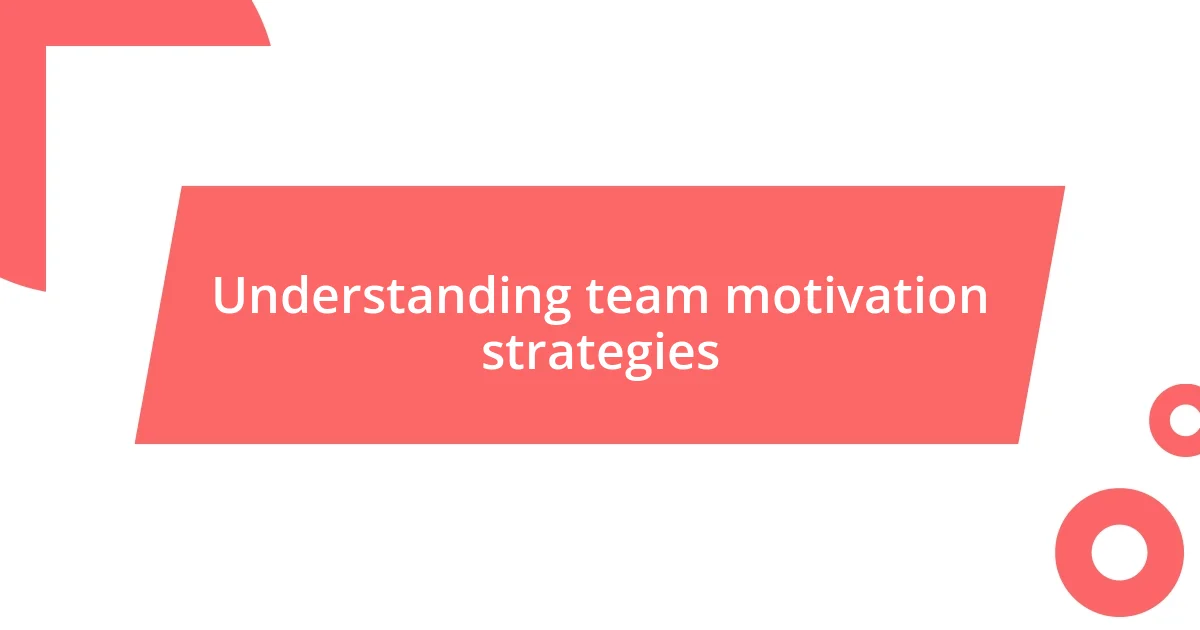
Understanding team motivation strategies
Understanding what drives team motivation is crucial for fostering a productive environment. I remember a time when I discovered that simply sharing personal goals can ignite passion among teammates. When I opened up about my aspirations during a meeting, I encouraged others to share theirs too, and it sparked a collaborative excitement that transformed our dynamics.
Moreover, recognizing individual strengths can significantly impact motivation levels. One of my colleagues was brilliant at problem-solving but often felt overlooked. When I made a conscious effort to highlight her contributions during discussions, I witnessed a remarkable boost in her confidence and enthusiasm. It made me wonder—how often do we take the time to acknowledge our teammates’ unique talents?
In my experience, creating a culture of appreciation cultivates lasting motivation. After organizing a casual team gathering to celebrate small wins, the atmosphere shifted. I could feel the energy in the room; it was evident that people felt valued and understood. Isn’t it remarkable that a simple gesture like this can create a ripple effect of motivation within the team?
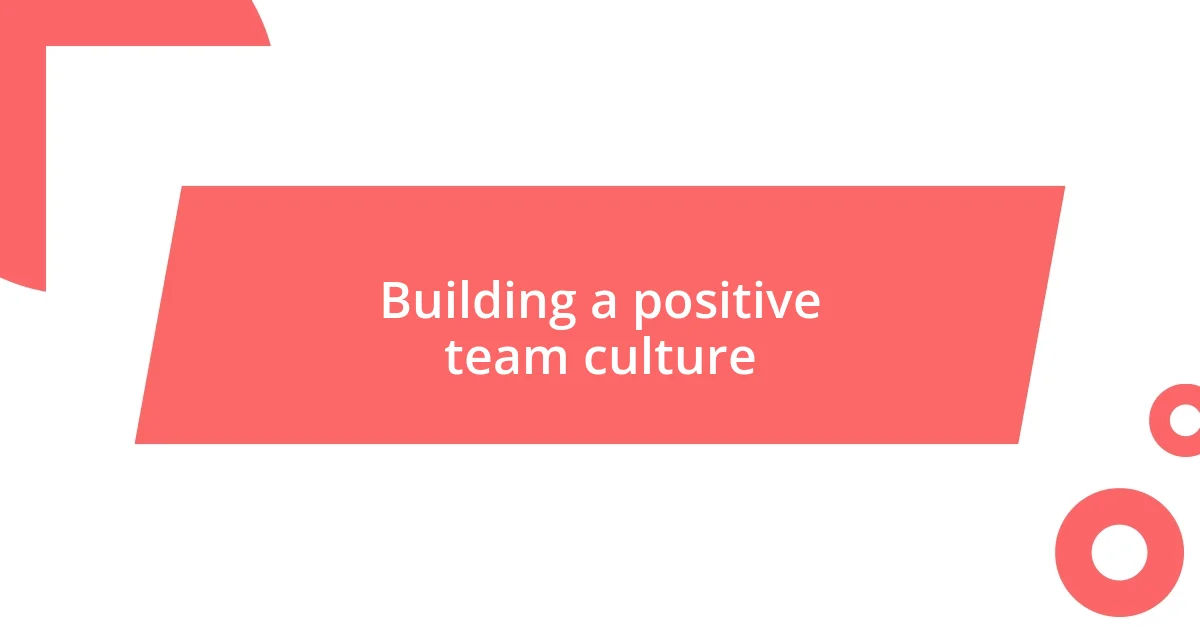
Building a positive team culture
Building a positive team culture is all about creating a space where everyone feels connected and valued. I once worked with a team that thrived on open communication. We made it a habit to start our meetings with a “win of the week” segment, where each member shared their successes, no matter how small. I noticed that this simple practice not only built camaraderie but also sparked an infectious enthusiasm for collective achievement.
To foster a supportive environment, consider these strategies:
- Celebrate Diversity: Recognize and embrace the unique perspectives each team member brings.
- Encourage Open Dialogue: Make it safe for everyone to voice their thoughts and concerns without fear of judgment.
- Prioritize Team Bonding: Organize activities that bring team members together outside of work tasks.
- Offer Support: Be proactive in helping teammates when they face challenges, both professionally and personally.
- Maintain Positivity: Focus on constructive feedback and highlight the positives in every situation.
These elements can significantly enhance team spirit and drive motivation. After all, when we feel good about the space we work in, it translates to greater productivity and happiness.
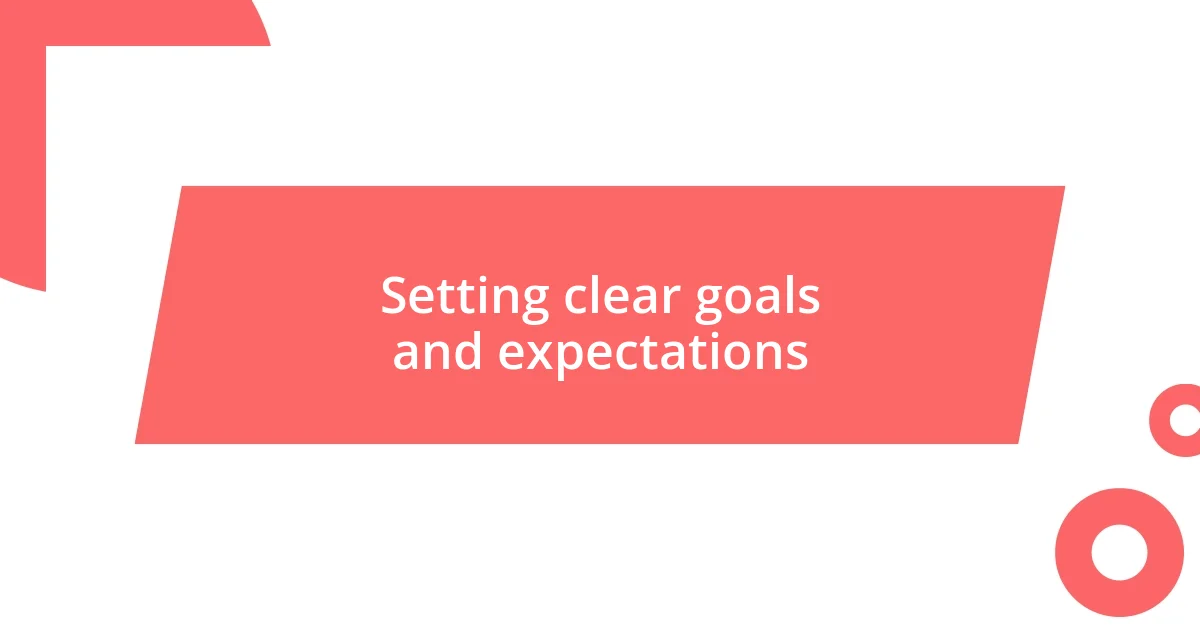
Setting clear goals and expectations
Setting clear goals and expectations is a cornerstone of effective teamwork. I remember leading a project where, at the outset, I took the time to map out specific objectives with my team. We crafted not just a checklist but a vision of what success looked like for each phase of our work. It was amazing to witness how this clarity fostered a shared sense of purpose. Everyone seemed more focused and driven, knowing exactly what we were working toward.
In my view, well-defined goals also serve as benchmarks for success. One time, we implemented a visual progress tracker, which hung right in our workspace. Each completed task felt like a small victory, and seeing our accomplishments made a huge difference. It not only motivated individuals but also reinforced the idea that we were in this journey together. That sense of collective achievement is so powerful; it reminds me how important it is to celebrate progress, no matter how minor.
While clear goals are vital, expectations play an equally important role. I learned this firsthand during a project where I set clear communication guidelines. I encouraged team members to voice their challenges without hesitation. This openness transformed our interactions and allowed us to tackle issues head-on. I realized that when team members understand not only what they need to achieve but also how to support one another, it creates an environment rich with motivation and collaboration.
| Aspect | Description |
|---|---|
| Goals | Specific objectives that provide direction. |
| Expectations | Guidelines for communication and support within the team. |
| Visual Tracking | A method to display progress and celebrate achievements. |
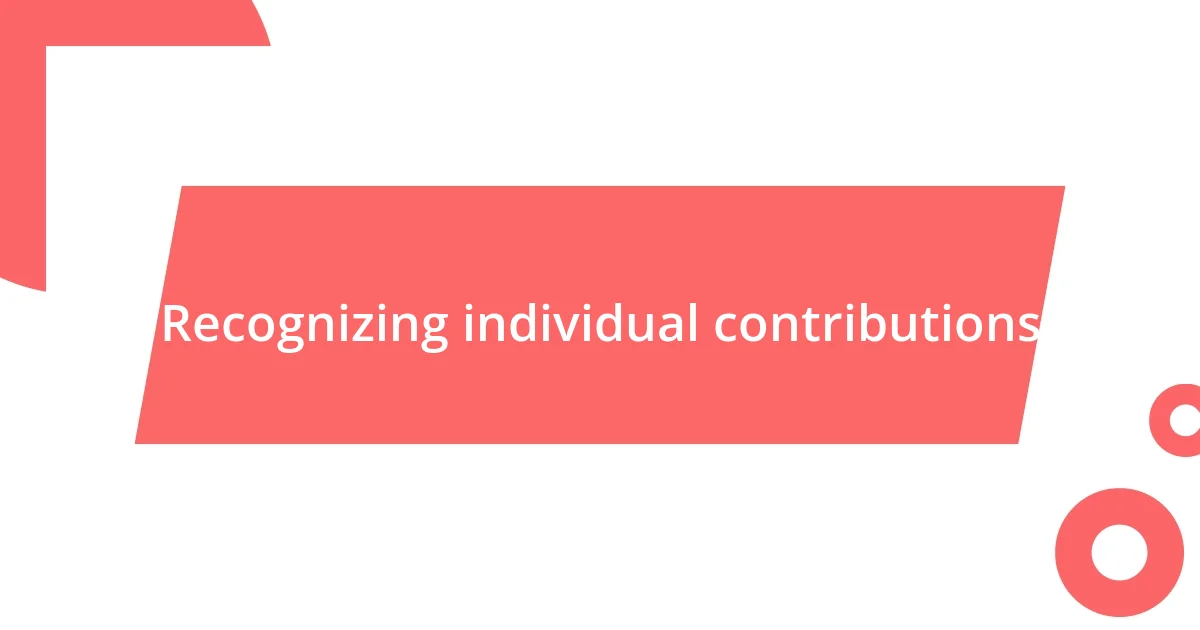
Recognizing individual contributions
Recognizing individual contributions is one of the most rewarding aspects of team dynamics. I once had a colleague who consistently went above and beyond, yet her efforts often went unnoticed. One day, I decided to highlight her work during a team meeting. The moment her accomplishments were recognized, I could practically see her confidence blossom. It reinforced for me just how powerful it is to shine a light on individual efforts; those moments of acknowledgment can fuel motivation in ways we might not even realize.
I find that personal touches matter, too. On another occasion, I created a “shout-out board” in our common area. Team members could write notes of appreciation for one another whenever they witnessed exceptional work. The little notes of gratitude piled up quickly, fostering a culture where recognition became the norm. I remember the smile on one team member’s face when he found a note commending his creative thinking during a recent project. It made me think—how often do we overlook the impact of simple recognition in nurturing confidence and belonging within our teams?
It’s fascinating how individual acknowledgment can catalyze collective success. I often reflect on a project where, after achieving significant milestones, we hosted mini-celebrations. During these gatherings, I shared stories of individual contributions, reinforcing how each person’s efforts propelled us forward. This not only motivated the recognized individuals but also inspired others to pursue excellence, fostering a culture where everyone feels that their input is both valued and critical to the team’s success. So, how can we make recognition a habitual practice? In my experience, it pays to be intentional about it!
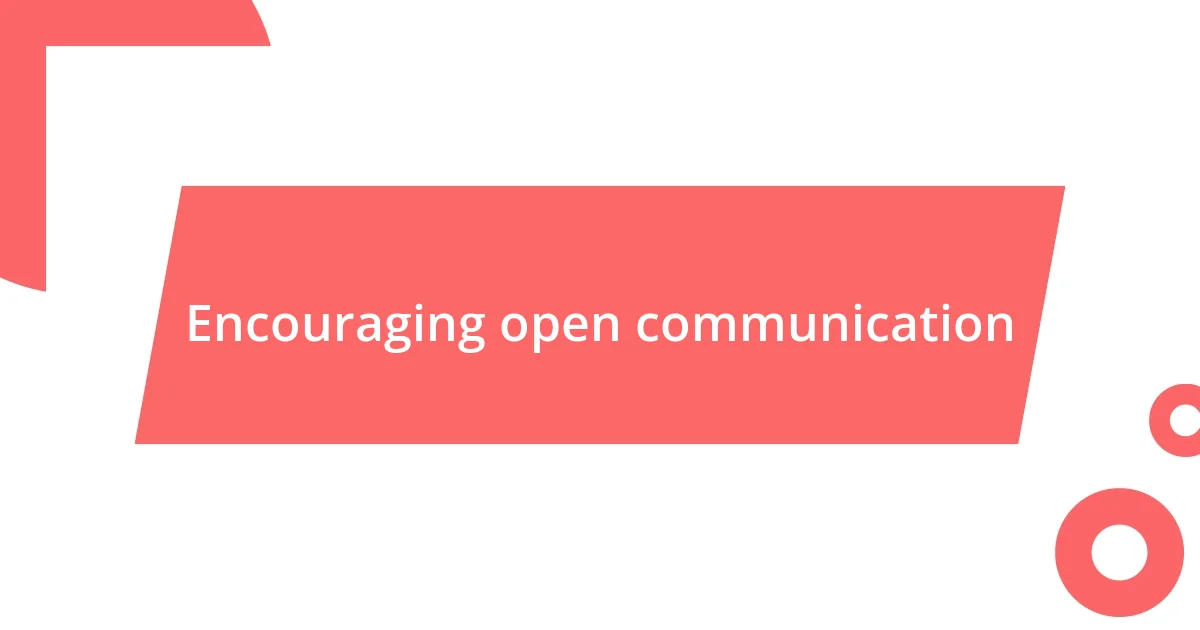
Encouraging open communication
Encouraging open communication is essential for nurturing a motivated team atmosphere. I remember one team meeting where I encouraged everyone to share their thoughts freely; it was like setting off a chain reaction. Hearing diverse perspectives not only sparked creativity but also made team members feel valued. I could see it in their eyes—when voices are welcomed, there’s a unique kind of energy that ignites collaboration.
In my experience, establishing a safe space for dialogue is crucial. There was a time when a team member hesitated to speak up about a concern they had. After I shared a personal struggle I faced on a different project, it helped break the ice. They realized that openness fosters trust, which ultimately paved the way for productive conversations. I learned that sometimes, showing vulnerability as a leader encourages others to share, too. Why not transform our work environment into one where everyone feels secure in expressing their ideas and worries?
Active listening also goes a long way in reinforcing open communication. I recall a project where I made it a point to summarize what each team member said during discussions. This small gesture made them feel heard and encouraged them to contribute more. I still remember the boost of morale it gave when my teammate remarked, “It’s refreshing to know my thoughts matter.” It’s amazing how a little attentiveness can cultivate an environment brimming with motivation, engagement, and trust. So, how can we further promote this authenticity in our interactions? I keep asking myself this, and the answer often lies in continually making space for every voice.
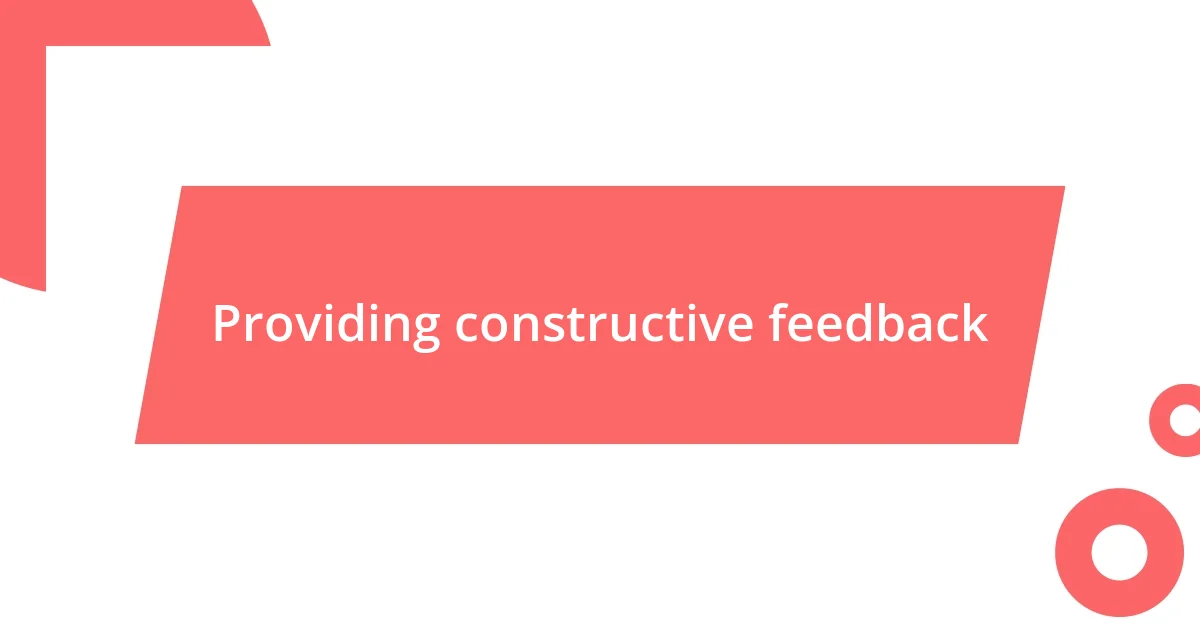
Providing constructive feedback
Providing constructive feedback is a vital part of motivating my teammates. I remember an instance when a teammate was struggling with a particular task. Instead of pointing out what went wrong, I approached it as a chance for us to collaborate. By focusing on their strengths and suggesting small, actionable improvements, I noticed their confidence start to rebuild. I often think about how constructive feedback should feel like a guiding hand rather than just criticism; it transforms challenges into growth opportunities.
In my experience, timing and setting play significant roles in delivering feedback. One afternoon, after a particularly intense project, I took my teammate aside for a casual coffee chat. I framed my feedback around our shared success, expressing appreciation for their unique contributions while gently steering the conversation toward areas for improvement. That relaxed environment melted away the usual tension that might accompany critical discussions. Reflecting on this, I realize that feedback can be a bonding experience if approached with empathy and understanding.
I also believe in the power of follow-up. After providing feedback, I make it a point to check in later on their progress. There was a time when I asked my teammate how they implemented my suggestions, and their eyes lit up as they shared their success stories. This ongoing dialogue reaffirmed that feedback should not be a one-off event but rather a continuous conversation. Doesn’t it make you wonder how much more engaged teams could feel if feedback became part of their daily rhythm? I know I’ve seen remarkable changes when both giving and receiving feedback is treated as a collaborative journey.
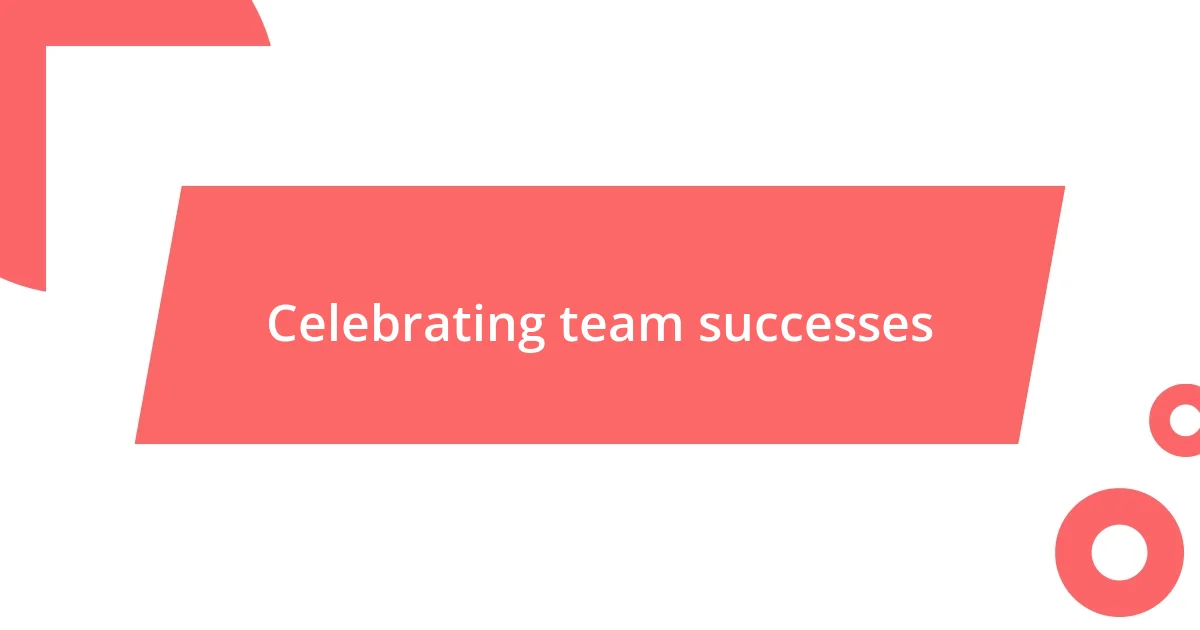
Celebrating team successes
Recognizing and celebrating our team successes is incredibly uplifting for everyone involved. I remember a project where we hit a milestone that felt monumental after so much hard work. After the final presentation, we gathered for a small celebration with snacks and shared stories of how we tackled different challenges. I still can’t forget the smiles on my teammates’ faces as they cheered each other on; it was a genuine moment of joy that reminded me how important it is to acknowledge our wins, no matter how big or small.
I’ve learned that celebration should reflect our team’s culture and values. For instance, during one particularly tedious quarter, I suggested we create a “Victory Board” filled with our achievements, large and small. Every time we reached a goal, we’d add an item to the board. Watching it fill up over time felt like a shared accomplishment, and it brought us closer as a team. It made me realize that recognizing our efforts together fosters a sense of unity and purpose. How often do you acknowledge your team’s milestones? I know from experience that these little moments can build momentum for future challenges.
A personalized touch can make celebrations even more meaningful. I once organized a small team lunch where I took the time to highlight individual contributions that led to our success. When I saw one of my teammates tear up out of gratitude, it struck me how deeply a recognition can resonate. It’s not just about the lunch; it’s about making everyone feel valued and appreciated. Celebrating success in a thoughtful way lays the groundwork for a motivated and dedicated team. After all, shouldn’t we make it a point to bask in the glow of our achievements together?










